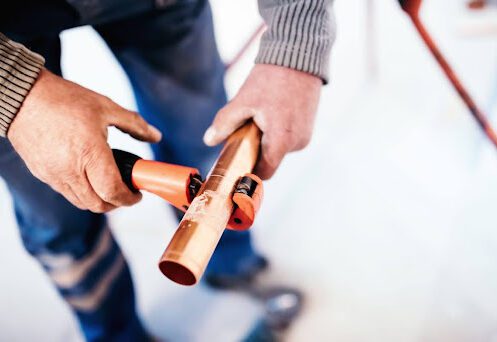When you’re planning a plumbing upgrade or need to replace old pipes, one of the first decisions you’ll face is choosing the right material. For decades, copper was the go-to choice for many homes. These days, cross-linked polyethylene (commonly known as PEX) has become a popular alternative. So which one is better for your home?
Let’s break it down in plain terms, comparing PEX and copper in the areas that matter most to families.
Durability and Longevity
Copper has a long track record for its strength and longevity. Many copper installations have lasted over 50 years, which is why older homes often still have copper systems in place. It’s naturally resistant to UV rays and won’t degrade when exposed to sunlight.
PEX, while newer to the scene, has proven to be tough in its own way. It can handle extreme temperature swings and doesn’t get brittle in the cold. For homes in areas with freezing conditions, PEX can offer a bit more flexibility under pressure. It’s less likely to burst if water freezes inside the pipe.
Installation and Flexibility
This is where PEX shines. It’s lightweight, flexible, and can be installed in long, continuous loops. That means fewer connections, which means fewer chances for a leak. It also allows plumbers to snake it around corners and through tight spaces without needing extra fittings.
Copper, on the other hand, is rigid and needs to be cut and joined with solder. That means more time, more labor, and more room for human error. It’s also more difficult to retrofit into existing homes unless the walls are already opened up.
Water Quality and Safety
Both PEX and copper are approved for drinking water, but there are differences. Copper is naturally resistant to bacterial growth and doesn’t leach chemicals into the water. That said, older copper systems can develop issues if your water is highly acidic, which might lead to corrosion over time.
PEX has been tested for safety and is generally considered safe for potable use. However, it is made of polyethylene, which has raised some questions about chlorine sensitivity and long-term stability in hot water systems. If your home has high chlorine levels, it’s worth asking your plumber about protective options.
Performance in Heat and Weather Conditions
Copper handles heat very well and is non-combustible, which makes it a safe pick in areas where fire risk is a concern. It also handles high pressure without warping or splitting.
PEX is more sensitive to high temperature, but it insulates better and doesn’t transfer heat the way copper does. That helps keep your hot water hotter as it travels to your shower or sink. It also performs well in weather extremes, especially in places where pipes are installed in exterior walls.
Compatibility and Maintenance
Copper pipes are compatible with most standard plumbing fixtures and materials. But in homes with hard water, mineral buildup can be a problem. Over time, this buildup can restrict flow and reduce efficiency, especially at junctions like valves and elbows.
PEX is more resistant to scale and mineral deposits. It also expands slightly, which helps it handle pressure changes without cracking. Just keep in mind, it’s not meant to be used outside where UV light can degrade the material. It also doesn’t connect directly to other plastic types like polyvinyl chloride, so transition fittings may be needed.
Cost and Value Over Time
Copper is typically more expensive than PEX, both in terms of material and labor. With fluctuating metal prices, the cost of a full copper installation can be tough to predict.
PEX is more affordable, faster to install, and requires fewer fittings and supports. That makes it a popular choice for new construction and remodels where repiping is involved. While the material itself is less expensive, many homeowners see added value in the lower labor costs and faster turnaround.
So, Which Pipe Is Right for Your Home?
Both copper and PEX come with their strengths, and each performs better in certain conditions. If you want a long-lasting, rigid option and are not concerned about budget, copper is a solid choice. If flexibility, speed, and cost savings matter more, PEX is a modern solution that continues to prove itself in residential plumbing.
Need Help Upgrading Your Plumbing System?
At Erica’s Plumbing, Air Conditioning & Restoration, we help homeowners across Broward County and Palm Beach County make confident decisions about their plumbing systems. Whether you’re building a new home or dealing with aging pipes that need replacement, our friendly experts will walk you through the options and recommend the best fit for your space.
We offer professional plumbing services, including whole-house repiping, with upfront pricing and fast turnarounds. Call today to schedule your service and get your home running the way it should!
